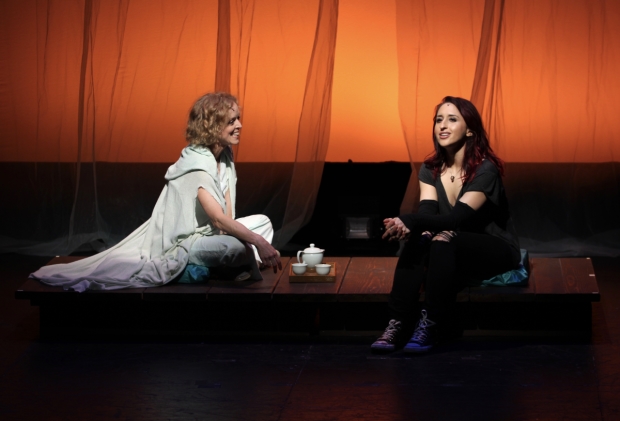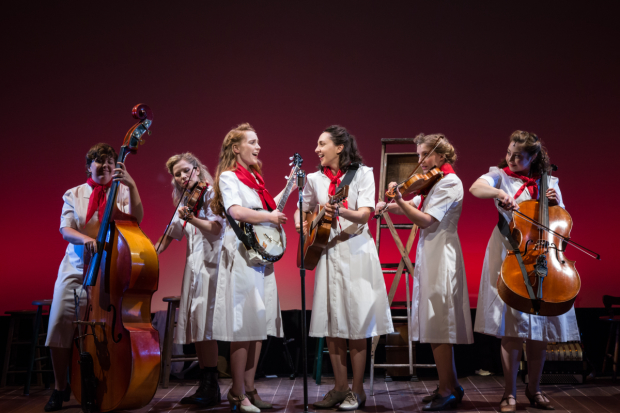NYMF 2017: Numbers Nerds, The Fourth Messenger, The Goree All-Girl String Band

(© Hunter Canning)
Numbers Nerds
By Dan Stahl
The 25th Annual Putnam County Spelling Bee, it turns out, was the first step down a slippery slope. Actually, make that a slope where m = -5. William Finn's 2005 Broadway musical spotlighted the drama of youth spelling contests; now Numbers Nerds, with a score by David Kornfeld, Dylan MarcAurele, and Alex Higgin-Houser, zeroes in on math competitions.
The show follows a team of high school "mathletes" in suburban Wisconsin as they compete in tournaments and struggle socially. Their sum total is five: Melissa (Maisie Rose), a wannabe Einstein who panics under pressure; Barbie (Madison Kauffman), an under-parented girl obsessed with unicorns; the studious Mary Kate (Danielle Davila), determined to win a scholarship so she'll be able to afford college; Amber (Tiffany Tatreau), a popular bitch hellbent on winning; and Leroy (Jake Morrissy), who grew up on 1990s American pop culture in Laos.
Numbers Nerds has two chief merits, the first of which is the score. The energetic, if generically show-tuney music, is by Kornfeld and MarcAurele, with cute lyrics by Alex Higgen-Houser. Melissa, singing the praises of Pythagoras, describes his life: "He starts his own religion / Instead of prayer they solved for X / And maybe had a lot of sex." At its best, the musical uses the language of math to tell its story, as when Mary Kate and Leroy express their exponentially growing feelings for each other in the song "Outliers."
Also deserving high marks is the show's cast. The spirit of teamwork celebrated by the musical's story is embodied by its actors, who share roughly equal time onstage, all holding their own. If there's an outlier here, it's Sharon Sachs as Ms. McGery, the theater teacher-turned-janitor who coaches Melissa through her stage fright. She's delightfully dramatic, whether twirling her mop like a cane or exulting when she hears that the math team has qualified for the National Math Sum-It in Poughkeepsie: "Finally, some kids of mine / will make it to New York."
All in all, this musical adds up to a lot of fun for numbers nerds and theater geeks alike.

(© Karen Shih)
The Fourth Messenger
By Dan Stahl
Roughly 2,500 years ago, a man named Siddhartha Gautama walked out on his wife and infant son. He spent the next six years in the wilderness, searching for an escape from human suffering. At last, during a night of meditation, he achieved liberation and became the Buddha, or "awakened one."
Singer-songwriter Vienna Teng and playwright Tanya Shaffer have teamed up to turn the Buddha's life story into a musical set in the modern world. The result is a work of wit, grace, and yes, enlightenment.
In their adaptation, the Buddha is a woman known as Mama Sid (get it?) whose spiritual teachings have attracted an international following. Her child, Raina — also a female in this musical reincarnation — interns at a news magazine. She pitches an exposé on Mama Sid in hopes of launching her career and punishing her mother for abandoning her.
Telling this story requires worldliness as well as soulfulness; miraculously, the cast, crew, and creators of The Fourth Messenger pull it off. Teng's harmonious music balances her and Shaffer's punchy lyrics, delivered at such moments as when the staff at Raina's magazine rejoice over the prospect of her article reviving their readership: "Nothing like a goddess falling down to earth / to strike a nerve with the masses. / That's how we'll save our asses!" The actors, most of them playing multiple roles, bring to life a range of humanity from a diseased drag queen to a college student whose biggest problem is not being able to decide what to major in. As Mama Sid, the only one of all these people reconciled with suffering, Nancy Anderson shines as a figure at once enlightened and flawed.
While The Fourth Messenger isn't perfect, it is human, and that's good enough.

(© Shira Friedman Photography)
The Goree All-Girl String Band
By Hayley Levitt
After seeing The Goree All-Girl String Band, one of NYMF's best offerings this year, it's hard to imagine how the story of the Goree Girls managed to get buried in history. It's the kind of tale that would seem almost too contrived if it weren't true. In short, a group of female criminals locked up at the Goree State Farm for Women decide to form a string band in order to play on the Thirty Minutes Behind the Walls radio program, which in turn, they hope will get them a pardon from the governor. Yes, in Depression-era America, that's apparently how criminal justice worked. Go figure.
In musical form, the result is a sweet story of female friendship, the reclamation of agency, and the healing power of music — themes that in Michael Bradley's book can sometimes drift into the formulaic, but in their unique context and with clear direction by Ashley Brooke Monroe, remain compelling. It's the story that hooks you, but it's the music that keeps you there — a soulful country score by Bradley (lyrics) and Artie Sievers (music) that captures the bluegrass style best in the Act 1 closer "Ridin' That Train" and the Act 2 highlight "Daddy Wore Boots" ("Did It Cuz I Had To" is a background-stories number that sounds like a countrified "Cell Block Tango").
It's all a pretty joyful platform for the cast's musicianship. Lauren Patten's vocals are stellar as the flirtatious ringleader Reable Childs; Ruby Wolf plays banjo and sings with an old-timey sultriness as the youngest and most desperate-to-escape band member Mozelle; Lizzie Hagstedt is the coolest bass player in town as Bonnie; Chanel Karimkhani takes up the cello; and Lauren J. Thomas and Kendra Jo Brook harmonize on the violin (Brook impressing with her fiddle solos).
Nattalyee Randall has a much-deserved vocal solo in "I Don't Mind" as Hattie Ellis, a black singer who was denied her right to sing with the otherwise white Goree Girls on the radio. Miche Braden also stands out in her performance of "How They Leave You," playing the more hardened veteran of Goree, "Cocaine" Nora Harris, whose story unfortunately ends rather abruptly. Some of the colors that contextualize the details of these women's lives are yet to be filled in, but on the whole, The Goree All-Girl String Band seems to have a bright future ahead.











